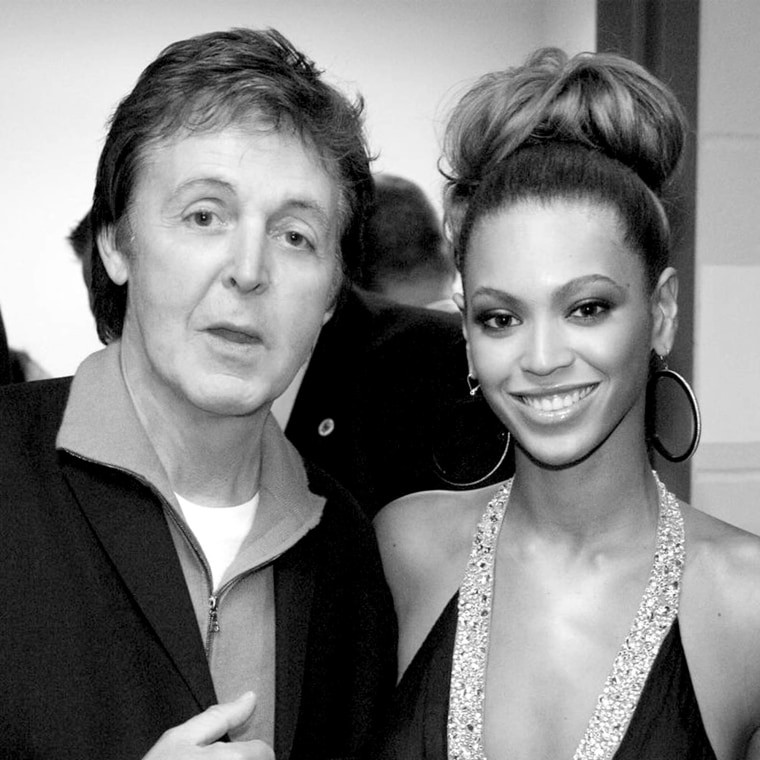Paul McCartney, the legendary Beatles songwriter, has publicly lauded Beyoncé’s fresh take on the iconic Beatles track “Blackbird.” In an Instagram post on April 4th, McCartney shared a photo with Beyoncé, praising her “magnificent” cover featured on her new album, “Cowboy Carter.” He emphasized that her rendition powerfully “reinforces” the song’s profound civil rights message, bringing renewed attention to the Blackbird Song Meaning and its historical context.
McCartney enthusiastically encouraged music enthusiasts to experience Beyoncé’s “fab version,” highlighting his personal communication with the artist. “I spoke to her on FaceTime, and she thanked me for writing it and letting her do it,” McCartney revealed. “I told her the pleasure was all mine, and I thought she had done a killer version of the song.” This exchange underscores the mutual respect between these musical titans and the significance of “Blackbird” resonating across generations.
 Beyonce, Sir Paul McCartney
Beyonce, Sir Paul McCartney
Image: Paul McCartney and Beyoncé are pictured together in a promotional image. McCartney publicly praised Beyoncé’s cover of “Blackbird,” emphasizing the song’s civil rights message.
Delving into the blackbird song meaning, McCartney explained the poignant inspiration behind “Blackbird.” The song, originally featured on the Beatles’ 1968 “White Album,” was sparked by the distressing television footage he witnessed in the early 1960s. These images depicted the harassment faced by Black students integrating newly desegregated schools in the American South, following the landmark 1954 Brown v. Board of Education Supreme Court decision. This historical context is crucial to understanding the depth of the blackbird song meaning and its continued relevance today.
“When I saw the footage on the television in the early ’60s of the Black girls being turned away from school, I found it shocking, and I can’t believe that still in these days there are places where this kind of thing is happening right now,” McCartney stated. He expressed hope that both his original song and Beyoncé’s powerful interpretation could contribute to easing racial tensions, a sentiment that fills him with immense pride.
McCartney has previously elaborated on the specific event that ignited the creation of “Blackbird”: the story of the Little Rock Nine. These nine teenagers bravely became the first Black students to attend Central High School in Little Rock, Arkansas, in 1957, facing intense opposition and requiring military escorts for their safety.
In a 2018 interview with GQ, McCartney recounted, “I was sitting around with my acoustic guitar, and I’d heard about the civil rights troubles that were happening in the ’60s in Alabama, Mississippi, Little Rock in particular.” His intention was to craft a song that could offer hope and solace to those enduring these struggles. Thus, “Blackbird” emerged as an anthem of resilience and encouragement in the face of adversity.
Expanding on the blackbird song meaning, McCartney clarified that the lyrics specifically address the young Black women at the heart of the civil rights movement. “In England, a bird is a girl, so I was thinking of a Black girl going through this; now is your time to arise; set yourself free; take these broken wings,” he explained. The metaphor of the “blackbird” singing “in the dead of night” encapsulates the spirit of hope amidst darkness and the journey towards liberation.
The lyrics, “All your life, you were only waiting for this moment to arise,” and “All your life, you were only waiting for this moment to be free,” resonate deeply with the themes of perseverance and the anticipation of freedom. These words, imbued with the blackbird song meaning, speak to the long struggle for civil rights and the yearning for equality.
Melba Pattillo Beals, a member of the Little Rock Nine, shared with The Washington Post that hearing Beyoncé’s rendition of “Blackbird” evoked a profound sense of pride in her role in school desegregation. “This song awakens so much,” Beals remarked, revealing that she only learned in 2016 of the Little Rock Nine’s influence on “Blackbird.” For Beals, the blackbird song meaning is deeply personal and historically significant. “Paul McCartney said by writing that song, ‘I hear you. I may not be able to rescue you, but I hear you singing in your dark,’” she recounted.
Beyoncé’s “Blackbird” cover is further distinguished by its use of McCartney’s original master recordings, incorporating his guitar playing and even the subtle sound of his toe-tapping, as reported by Variety. Adding her own artistic layers, Beyoncé included soaring harmonies from four Black country music singers – Reyna Roberts, Tanner Adell, Brittney Spencer, and Tiera Kennedy – alongside new orchestral and bass arrangements. This fusion of classic and contemporary elements underscores the timelessness of the blackbird song meaning and its power to connect with diverse audiences.
In conclusion, Beyoncé’s rendition of “Blackbird” serves not only as a powerful musical tribute but also as a vital resurgence of the song’s core message. McCartney’s enthusiastic endorsement and the poignant history behind the song amplify the blackbird song meaning, reminding us of the ongoing relevance of the civil rights movement and the enduring power of music to inspire hope and change. Beyoncé’s cover ensures that the blackbird continues to sing its song of freedom to a new generation.
